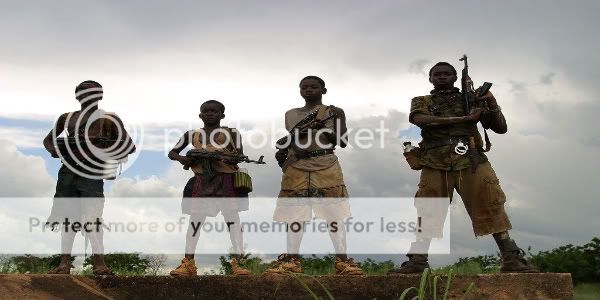This Guild is currently in construction!
Invisible Children
English
Niños Invisibles
Spanish
Enfants Invisibles
French
Unsichtbare Kinder
German


Credit is given to the Invisible Children topic for the information gathered below.

✘The war in northern Uganda has been called the most neglected humanitarian emergency in the world today. For the past 23 years, the Lord’s Resistance Army (LRA) and the Government of Uganda (GoU) have been waging a war that has left nearly two million innocent civilians caught in the middle. The GoU's attempt to protect its citizens from this rebel militia has largely failed, resulting in an entire generation of youth that has never known peace.
✘The LRA rebel movement can be traced back to a woman named Alice Lakwena. In the 1980s, Lakwena believed the Holy Spirit spoke to her and ordered her to overthrow the Ugandan government for being unjust to the Acholi. Lakwena and her followers, known as the Holy Spirit Movement, gained momentum as resentment toward the government increased. When Lakwena was exiled and no clear leader of the movement was left, Joseph Kony, who claimed to be Lakwena’s cousin, took control and transformed Lakwena’s rebel army into the LRA.
✘Kony's LRA did not receive the same support as the Holy Spirit Movement from the Acholi people. With dwindling approval for their cause and heightened government offensives, the rebels resorted to abducting children and indoctrinating them into their ranks. It is estimated that more than 90% of the LRA’s troops were abducted as children.
✘In 1996, as a response to the LRA attacks in the villages, the Ugandan government forcibly evicted thousands from their homes, relocating them into overcrowded camps in hopes of providing protection. But over a decade later, roughly one million individuals still live in these camps and struggle to survive among the effects of abject poverty, rampant disease, and near-certain starvation.
✘In recent years more and more international attention has been focused on this crisis. In 2001, the US Patriot Act officially declared the LRA to be a terrorist organization - a huge step in drawing attention to the conflict and the atrocities committed by the LRA. In 2004, Congress passed the Northern Uganda Crisis Response Act, the first piece of American legislation to address this disaster. And in 2005, the International Criminal Court (ICC) issued arrest warrants for Joseph Kony and four of his top commanders.
✘Pressure from the international community (particularly from EU and Canada) combined with a strong desire to secure peace has brought the Government of Uganda and the LRA to the negotiating table on numerous occasions, though they have yet to find a peaceful resolution. The most recent talks commenced in Juba, Sudan in July 2006, and a Cessation of Hostilities Agreement was signed the following month.
✘In July 2007, in response to an increased concern for peace in northern Uganda by the American people, the US State Department appointed Tim Shortley to Senior Advisor for Conflict Resolution with his immediate focus on northern Uganda. This action solidified the US’s commitment to end this conflict peacefully. That same year, the United Kingdom bolstered their commitment to peace by allocating £70 million in aid, while Germany committed to a 25% increase in aid to Uganda by October 2010. Canada later became more than an international supporter of the peace process in February 2008 by joining the peace talks as an official observer (though the Canadian officer on the ground has since been removed from the region).
✘At this point in time, the Cessation of Hostilities Agreement has expired and Joseph Kony has failed to sign the Final Peace Agreement for a fourth time, proving his promises to be futile and ultimately disabling the peace talks. Uncertainty lingers, not only for the thousands displaced in northern Uganda but across the entire northeastern border region of DR Congo, South Sudan, and Central African Republic.
✘Since September 2008, hostility in the Orientale province in DR Congo and Western Equatoria in South Sudan has reached a feverish pitch. LRA attacks have become more frequent and hostile, provoking military action against the rebel group. In an unprecedented joint military operation, the governments of Uganda, DR Congo, South Sudan and the Central African Republic launched an attack on LRA strongholds within DR Congo. “Operation Lightning Thunder”, the name designated for the counteroffensive, was largely unsuccessful in light of both the failure to reach top LRA leadership and the onslaught of violence that followed.
✘One month later on December 24th, 2008, the LRA launched a retaliatory attack against the people of DR Congo. In apparent desperation and a renewed will to spread terror to DR Congo, the LRA murdered over six hundred and abducted more than one hundred and sixty children to fight amongst its ranks. More than 104,000 Congolese have been displaced since Christmas in attempts to escape the LRA forces.
✘As the motives of the LRA become more ambiguous and their crimes more horrific, Invisible Children remains committed to seeking sustainable solutions to foster an environment that encourages peace. We are supporting and equipping a generation ravaged by war so that they can finally know peace. Invisible Children addresses the need for access to education and economic development through innovative programs on the ground. To learn more about these programs and how you can contribute to lasting peace and development click here.
The forum below is dedicated toward Invisible Children:

Contributor/Ally Guilds:

http://www.gaiaonline.com/guilds/index.php?guild_id=268997&_gaia_t_=678

